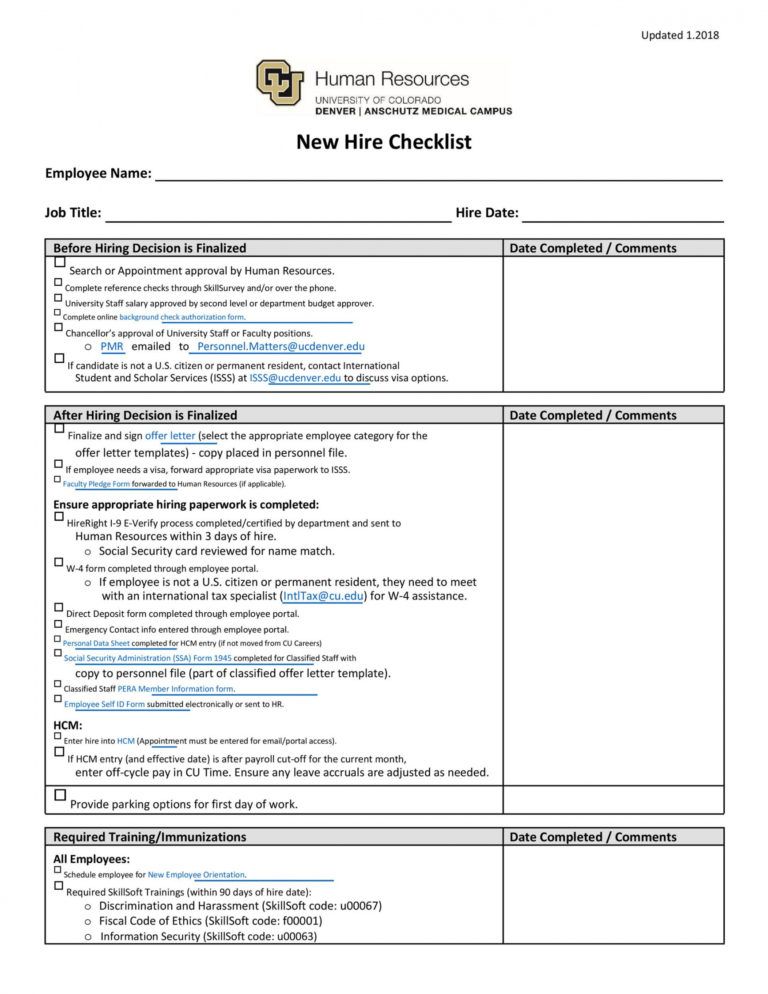New Hire Paperwork: Everything You Need to Know

Starting a new job is an exciting time, but it often comes with the task of handling new hire paperwork. This paperwork is critical as it establishes the legal and administrative foundation for your employment. Understanding the various documents, their significance, and how to manage them can make this transition smoother and less daunting.
Types of New Hire Paperwork

When you start a new job, you'll encounter several types of documents:
- Employment Contract: This is the agreement between you and your employer outlining your employment terms, including job responsibilities, salary, benefits, work hours, and conditions for termination.
- Form W-4 (for U.S. Employees): Used to determine how much federal income tax should be withheld from your pay.
- I-9 Form: This verifies your identity and legal eligibility to work in the U.S.
- Employee Handbook: Contains company policies, guidelines on conduct, benefits information, and more.
- Benefits Enrollment Forms: To enroll in health insurance, retirement plans, etc.
- Direct Deposit Forms: Allows for automatic deposit of your salary into your bank account.
- Emergency Contact Information: Details needed in case of emergencies at work.
- Non-compete Agreements or Confidentiality Agreements: These protect the employer's business interests.
🔍 Note: The exact paperwork can vary by country, company size, and industry. Always check local regulations for specific requirements.
Key Documents in Detail

Employment Contract

The employment contract is your legal agreement with your employer. Here’s what to look for:
- Duration of Employment: Is it temporary, contract-based, or permanent?
- Compensation: Details on salary, bonuses, commissions, and other financial terms.
- Work Hours and Leave: Information on expected work hours, overtime policies, and leave entitlements.
- Confidentiality: Any obligations to protect company secrets or intellectual property.
- Termination: Notice periods, severance, and conditions under which employment can end.
Form W-4

This IRS form helps calculate the amount of federal income tax to withhold from your salary. Pay attention to:
- The number of allowances you claim can influence the amount of tax withheld.
- Special withholdings for additional income sources.
I-9 Form

Employers must verify the identity and employment eligibility of all employees. You need to:
- Provide acceptable documentation to verify your identity and work authorization.
- Be prepared to update this if your work authorization status changes.
Employee Handbook

Though not a legal document, the handbook is critical for understanding:
- Company culture and expectations.
- Policies on attendance, leave, dress code, and behavior.
- How grievances and issues are handled.
Benefits Enrollment

These forms allow you to opt into various company benefits:
- Health Insurance: Choose from various plans that might fit your personal needs.
- Retirement Plans: Like 401(k) in the U.S., where employer matching contributions might be available.
- Other Benefits: Dental, vision, life insurance, disability insurance, etc.
🌿 Note: Carefully review the benefits package; it can significantly impact your overall compensation.
Managing Your Paperwork

To ensure a smooth process:
- Read Carefully: Take the time to read through every document. Ask for clarification if anything is unclear.
- Keep Copies: Always keep copies of everything you sign. This can be helpful for reference or in case of disputes.
- Use Online Portals: Many companies use electronic HR systems to manage paperwork. Utilize these for simplicity.
- Set Reminders: For any deadlines related to paperwork, especially for benefits enrollment.
- Prompt Submission: Ensure all forms are submitted before or on your start date to avoid delays in payment or access to benefits.
What Happens After Submission?

Once you submit your paperwork:
- Your employer will process your information, setting up payroll, benefits, and your HR record.
- There might be an orientation session or meeting with HR to review everything.
- You'll receive any necessary ID badges, login credentials, or other office supplies.
In conclusion, managing your new hire paperwork efficiently sets the tone for your employment relationship. Being thorough and proactive with these documents ensures that your employer has all the necessary information to pay you correctly, set you up with benefits, and comply with legal requirements. Remember, this paperwork is not just a formality; it's the foundation of your work contract and legal rights at your new job. Understanding your documents helps you start on the right foot and can prevent issues down the line.
What if I miss a deadline for submitting paperwork?

+
If you miss a deadline, contact HR immediately. They can usually provide an extension or guide you on how to proceed, though some delays might impact your start date or benefits activation.
Can I negotiate the terms in my employment contract?

+
Yes, many terms in employment contracts are negotiable. Focus on aspects like salary, benefits, and work hours. However, legal requirements or company policies might limit some terms.
What should I do if I don’t understand parts of my paperwork?

+
Don’t hesitate to ask for clarification from HR or your hiring manager. It’s important to understand the terms of your employment fully.



